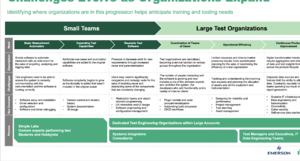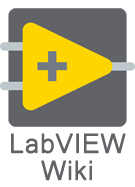LabVIEW Learning Materials: Difference between revisions
No edit summary |
No edit summary |
||
| Line 8: | Line 8: | ||
=Development Processes and Tooling= | =Development Processes and Tooling= | ||
==Static Code Analysis== | |||
==Dynamic Code Analysis== | |||
==Documentation== | |||
==Unit Testing== | |||
=Frameworks and Software Patterns= | =Frameworks and Software Patterns= | ||
==Actor Based Patterns== | |||
==Design Patterns== | |||
===PC-QSM=== | |||
Revision as of 15:32, 23 September 2024
- See also: category:LabVIEW fundamentals
Learning LabVIEW
This page provides a recommended set of resources for LabVIEW programmers. It breaks the content across six phases of maturity and experience so that users may self-identify what content is most relevant for them based on their experience. Most of the content is crowd-sourced and freely available from ni.com and other sources like YouTube.

LabVIEW Fundamentals
Development Processes and Tooling
Static Code Analysis
Dynamic Code Analysis
Documentation
Unit Testing
Frameworks and Software Patterns
Actor Based Patterns
Design Patterns
PC-QSM
Formal Training
Formal training on LabVIEW is available from several providers. Offerings differ based on prior LabVIEW experience level and the preferred delivery method. Common delivery methods include:
- In-person instructor-led
- Remote instructor-led (usually through a web conference)
- Online self-paced (usually through a combination of pre-recorded lecture videos and exercise solution videos)
- Self-paced with a manual
National Instruments has a suite of courses ranging from beginner to advanced as well as several specialty topics such as LabVIEW Real-Time and LabVIEW Connectivity. National Instruments offers all common delivery methods mentioned above except online self-paced. Other LabVIEW training providers such as Sixclear provide this online self-paced environment. Sixclear's same curriculum is also delivered through in-person instructor-led training. Durability is another provider of in-person instructor-led training.
Recommended training courses for those with no knowledge of LabVIEW are the National Instruments Core 1 and Core 2 courses, the Sixclear LabVIEW Fundamentals I and II courses, or the Durability LabVIEW 101 and 102 courses. All sets of courses are geared to a user with little to no LabVIEW experience and teach the proficiencies outlined by the Certified LabVIEW Associate Developer (CLAD) exam as well as simple DAQ and instrument control.
Common arguments justifying formal training revolve around the idea that the sum cost of developers' time is greater than the cost of training because:
- the LabVIEW graphical programming paradigm is appreciably different than traditional text-based programming
- costly mistakes commonly occur when moving from simple LabVIEW applications to more complex applications, especially when developing parallel loop applications
Alternatives to Formal Training
National Instruments maintains a list of LabVIEW reference books as an alternative to formal training.
Another alternative to formal training are half-day "LabVIEW Hands-On" workshops offered by National Instruments. Recommended follow-ups are the "G Programmer's reference manual" and the LabVIEW "User Manual" found in the LabVIEW documentation.
External Links
Some online tutorials:
- VI High LabVIEW Video Tutorial Blog by Sixclear
- Some NI courses, including videos (requires an active support contract with NI)
- VI Shots LabVIEW Video Tutorials
- NI Tutorials (including videos and exercises) - http://zone.ni.com/devzone/cda/tut/p/id/7466
- More links at NI's site - http://www.ni.com/training/labview.htm
- Software Engineering with LabVIEW (generally requires some LabVIEW knowledge) - http://zone.ni.com/devzone/cda/tut/p/id/7117
- Connexions Tutorial (written by NI) - http://cnx.org/content/col10241/latest/
- LabVIEW Tutorials - http://www.upscale.utoronto.ca/GeneralInterest/LabView.html
- Videos of NI's LabVIEW Core 3 course (8 full lessons) - http://www.youtube.com/playlist?list=PL3E1DD4C18D357331
- Tutorial videos (some are free) - http://www.fafiles.com/
- Learning LabVIEW - http://learnlabview.blogspot.com/
- LabVIEW Tutorial Basics (BEKA, German) - http://www.fu-net.de/lv/lv01/
- LabVIEW Tutorial Advanced Techniques (BEKA, German) - http://www.fu-net.de/lv/lv02/
